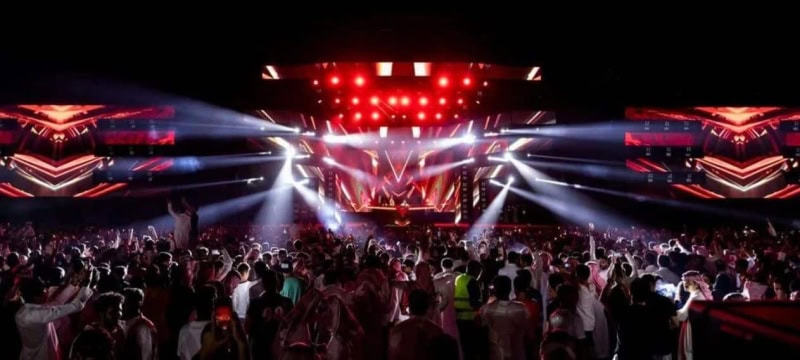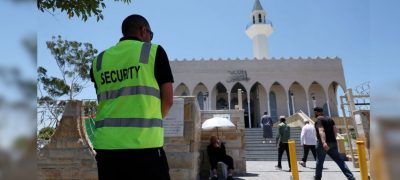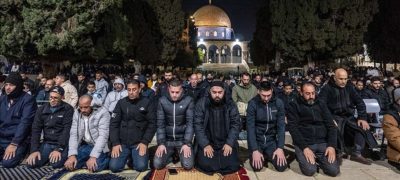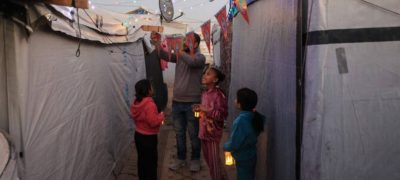Amid swirling smoke and flashing spotlights, 29-year-old Saudi DJ Nouf Sufyani, better known as Cosmicat, sang along to Fatboy Slim’s “Right Here, Right Now” at the Balad Beast rave in Jeddah. She looped part of the melody, building anticipation before grabbing the microphone and shouting to the enthusiastic crowd, “Right here, right now — we’re Jeddah!”
This was the second night of Balad Beast, a two-day rave held earlier this month in Saudi Arabia’s second-largest city. The event is part of Soundstorm, a government-supported music festival series that began in 2019, attracting international stars like Bruno Mars and renowned DJ Solomun.
Read more: Saudi Prince MBS Stuns the World with $450M Purchase of Most Expensive Painting Ever Sold
Fawaz Utaibi, a 26-year-old English teacher, was thrilled to join the festivities in Jeddah’s Balad (Old Town), where a giant animated cat’s head was projected onto the coral-stone buildings in sync with the music. Reflecting on the city’s transformation, he remarked, “Five years ago, there was nothing to do here — people only came to buy traditional goods. Now, it’s a place to celebrate.”
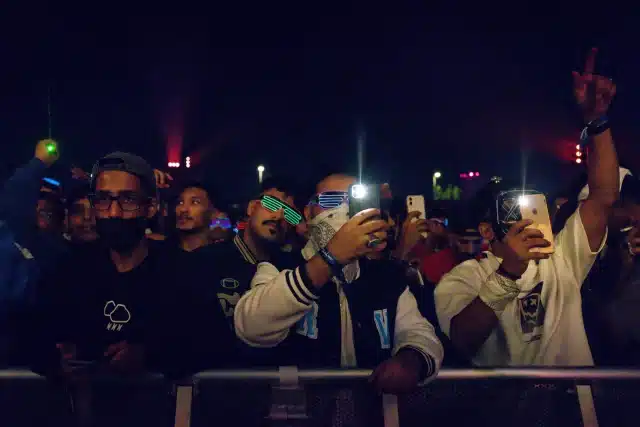
“Look around. It’s unbelievable: we’re partying in Saudi Arabia.”
Balad Beast is part of Vision 2030, the sweeping transformation of Saudi Arabia led by Crown Prince Mohammed bin Salman, who launched the initiative shortly after becoming the heir to the throne in 2017. The plan aims to diversify the nation’s oil-reliant economy and shift its image from a strictly religious kingdom to a regional hub for entertainment.
The campaign primarily targets the two-thirds of Saudi citizens under 35. The 37-year-old crown prince hopes to encourage young Saudis to live, work, and enjoy themselves in their home country, rather than seeking jobs abroad or spending billions each year on entertainment in places like Dubai or Bahrain’s capital, Manama.
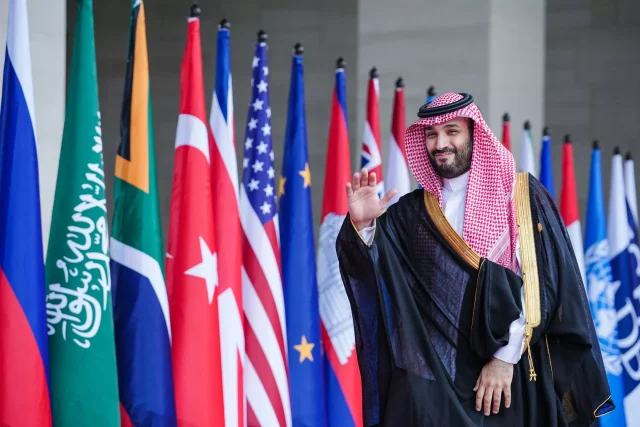
The rapid pace of change in Saudi Arabia has left longtime residents stunned, much like Dorothy stepping from her dull Kansas home into the vibrant world of Oz. December alone saw a packed schedule of events, including Balad Beast, the Red Sea International Film Festival, the Dakar Rally, the Riyadh Season’s concerts and sports, and the Boulevard Riyadh, a world fair-like event with pavilions representing countries like the U.S., which showcased an interstate highway, a Magnolia Bakery, and a police car.
Supporters of Crown Prince Mohammed bin Salman, recently appointed prime minister, applaud him as the only leader with the boldness and power to drive such a dramatic transformation of Saudi society. At Jeddah’s Balad Beast, in a scene unimaginable just a few years ago, Fawaz Utaibi sipped a mocktail alongside a female friend without a hijab, while other attendees wore jeans, shorts, crop tops, and even mesh shirts. Billboard-sized speakers blasted electronic music as a female performer sang onstage, and men and women danced together.
“Unless you grew up here, you can’t grasp the significance of what’s happening,” said Ahmad Ammary, 44, the DJ and music producer behind Soundstorm.
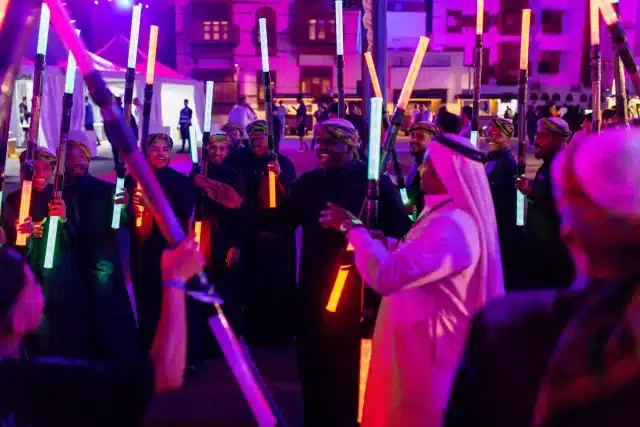
Critics argue that while social liberalization has progressed in Saudi Arabia, it has been accompanied by the tightening of a politically restrictive environment, with Crown Prince Mohammed bin Salman wielding unchecked power. They compare his leadership to more centralized Arab dictatorships like those in Egypt and Syria, contrasting it with Saudi Arabia’s previously more consultative governance.
The crown prince is also accused of using harsh methods to silence anyone who opposes or shows insufficient support for his policies, including Saudi journalist Jamal Khashoggi, who was killed by a Saudi hit squad at the Saudi Consulate in Istanbul in October 2018. U.S. intelligence concluded that the crown prince ordered the killing, a claim he denies.
Last summer, two Saudi women were sentenced to 34 and 45 years in prison, mainly for expressing dissent on social media, according to human rights groups, which described the sentences as the harshest ever given to activists. Saudi authorities claim the cases involved more than social media activity but did not provide details.
The political climate is such that those critical of government policies—whether about the limited potential of tourism revenue replacing oil income or concerns over the prioritization of entertainment projects over infrastructure needs—are unwilling to voice their opinions publicly. On Twitter, a popular platform in Saudi Arabia, previously critical accounts have been suspended or deleted, and others now focus on safe, non-controversial topics.
The once-powerful religious clerics, who supported the ruling Saud family, have also been subdued. Imams who opposed the liberal reforms have been jailed, and the religious police, once notorious for enforcing strict moral codes, now support the government’s stance, acknowledging they overstepped in the past and now promote virtuous behavior without imposing it.
Though the political crackdown may seem at odds with the social reforms, analysts suggest the crown prince views both as necessary. According to Hussein Ibish, a scholar at the Arab Gulf States Institute in Washington, Saudi leadership believes these liberalizations are essential for creating a post-oil economy and turning citizens into productive members of society. However, they also see these changes as potentially destabilizing for the regime.
While the crown prince’s authoritarian approach is concerning, Ibish acknowledges that most of the reforms are “incredibly important” and are transforming the country, largely for the better. Many young Saudis view the crown prince’s policies as a long-overdue opportunity to embrace a more open way of life.
“From the outside, people associate Saudi Arabia with Mecca, Medina, hajj, umrah, and religion—it’s deeply woven into our identity,” said Ahmad Ammary, the organizer of Soundstorm. These religious associations, he added, have shaped global expectations of how Saudis should behave in public.
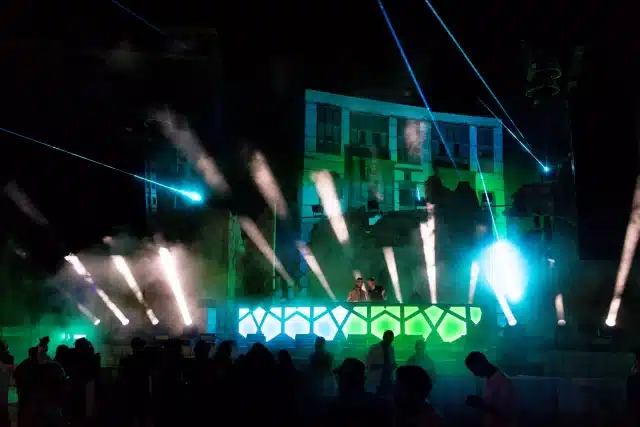
“Growing up, we were taught not to stand out. When I’d visit home, I’d switch to my ‘Saudi self’—calm, proper, and straightforward. Don’t smile too much,” said Ahmad Ammary, who had lived in the U.S.
Though Ammary has been a DJ since 1997, it wasn’t something he felt proud of. He performed at private parties for a small circle of friends. The first Soundstorm festival was a “social experiment,” during which he was amazed to discover many underground communities.
“This community has evolved from small, paranoid groups to people who can celebrate openly and proudly. I’m proud of the cultural Band-Aid we’re ripping off,” he said, adding, “It’s not a new change—it’s always been here, just hidden.”
The signs of this cultural shift, both literal and symbolic, are everywhere. At Balad Beast, three 21-year-old law students—Leen, Jood, and Lujain—spoke about growing up with a segregated life, where men still controlled how they dressed, where they worked, and if they stayed married. Recent years have seen major reforms, such as the lifting of the ban on women driving and the loosening of male guardianship laws, including restrictions on getting passports or traveling without male permission.
“We’re the transitional generation,” said Lujain, who felt more confident about relationships and career options, noting that divorce is now easier. While all three expressed concerns about sexual harassment, they believed the police would now assist rather than shame them for their attire. “Before, men would get away with it,” Jood said.
Signs at the festival reminded attendees to “Look, don’t stare” and “Be friendly, but don’t overdo it.” Male and female guards, vigilant like chaperones at a school dance, monitored the event, which was free from alcohol, still banned in the kingdom but expected to be legalized soon under certain conditions.
For women, these changes have unlocked new opportunities. DJ Cosmicat, formerly a dentist, saw music as a possibility as the cultural landscape shifted. According to official statistics, over 35% of the Saudi workforce is now made up of women, more than double what it was five years ago.
The feared backlash from religious conservatives has not materialized in a significant way, though it’s unclear if this is due to fear, indifference, or both. At the Boulevard Riyadh event, women in black niqabs stood alongside more vibrantly dressed attendees, enjoying music acts that would have been considered scandalous just a few years ago.
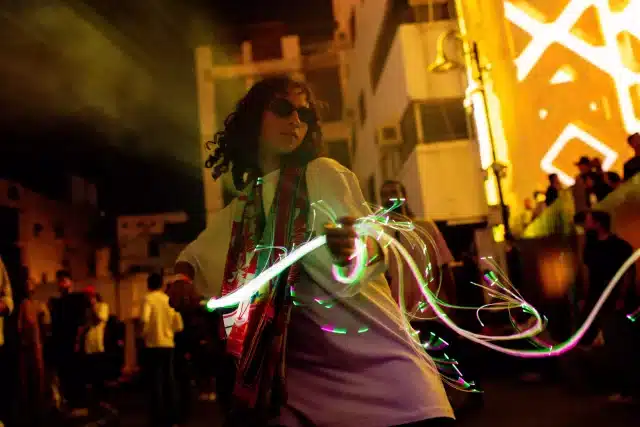
“Yes, it’s great that kids have more opportunities now,” said Mohammad Bukhari, a 43-year-old Aramco employee, as he wrestled with a giant inflatable banana while visiting the Japanese pavilion with his three children. “But we still need to be cautious about negative influences on them.”
While international criticism of Crown Prince Mohammed bin Salman, especially after the killing of Jamal Khashoggi, has lessened, domestic political repression continues. The kingdom carried out its largest mass execution in history, with 81 people put to death in a single day in March. Despite this, the Red Sea Film Festival recently drew stars like Sharon Stone, Guy Ritchie, Shah Rukh Khan, and Michelle Rodriguez. Saudi sovereign funds have also heavily invested in companies like Amazon, Walt Disney, and Nintendo.
Last year, Human Rights Watch urged performers and promoters to either speak out against Saudi rights abuses or boycott events like Soundstorm, calling them efforts to launder the kingdom’s reputation.
Ammary, the organizer of Soundstorm, dismisses this view of his event, which is just one of the 3,800 organized by the Saudi General Entertainment Authority, a government department established by the crown prince in 2016. “It makes me roll my eyes,” he said. “As if our only goal is to impress the world. We have over 30 million people to keep happy. This investment is for them.”
Nineteen-year-old Mashari Sultan would agree. Dressed in white pants, a leather jacket, sunglasses, and mismatched fingerless gloves, he smiled as he strolled down Jeddah’s Balad. “This is the first time I’ve ever dressed the way I want. I felt brave enough to dye streaks in my hair,” he said, laughing as he admitted that his parents didn’t know he was at Balad Beast.
“Everyone has their own way of expressing themselves. My parents wouldn’t understand. We’re from a different generation.”


